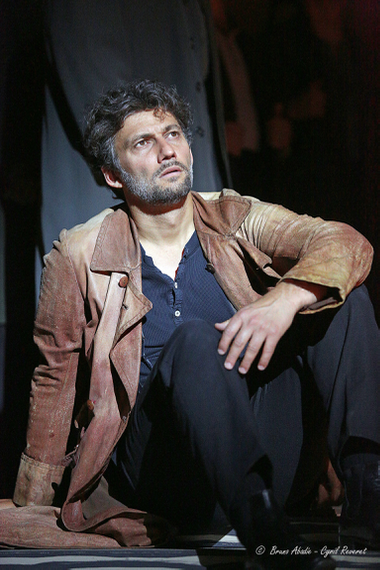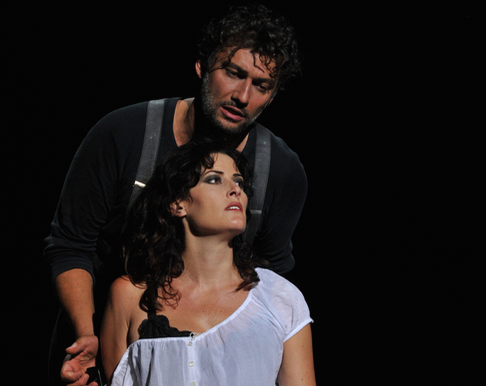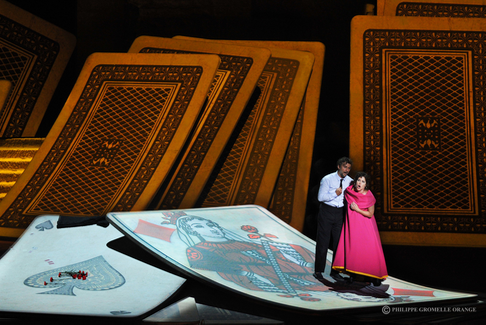
15 Jul 2015
Carmen in Orange
Some time ago in San Francisco there was an Aida starring Luciano Pavarotti, now in Orange it was Carmen starring Jonas Kaufmann. No, not tenors in drag just great tenors whose names simply outshine the title roles.
English Touring Opera are delighted to announce a season of lyric monodramas to tour nationally from October to December. The season features music for solo singer and piano by Argento, Britten, Tippett and Shostakovich with a bold and inventive approach to making opera during social distancing.
This tenth of ten Live from London concerts was in fact a recorded live performance from California. It was no less enjoyable for that, and it was also uplifting to learn that this wasn’t in fact the ‘last’ LfL event that we will be able to enjoy, courtesy of VOCES8 and their fellow vocal ensembles (more below …).
Ever since Wigmore Hall announced their superb series of autumn concerts, all streamed live and available free of charge, I’d been looking forward to this song recital by Ian Bostridge and Imogen Cooper.
Although Stile Antico’s programme article for their Live from London recital introduced their selection from the many treasures of the English Renaissance in the context of the theological debates and upheavals of the Tudor and Elizabethan years, their performance was more evocative of private chamber music than of public liturgy.
Evidently, face masks don’t stifle appreciative “Bravo!”s. And, reducing audience numbers doesn’t lower the volume of such acclamations. For, the audience at Wigmore Hall gave soprano Elizabeth Llewellyn and pianist Simon Lepper a greatly deserved warm reception and hearty response following this lunchtime recital of late-Romantic song.
For this week’s Live from London vocal recital we moved from the home of VOCES8, St Anne and St Agnes in the City of London, to Kings Place, where The Sixteen - who have been associate artists at the venue for some time - presented a programme of music and words bound together by the theme of ‘reflection’.
'Such is your divine Disposation that both you excellently understand, and royally entertaine the Exercise of Musicke.’
‘And there was war in heaven: Michael and his angels fought against the dragon; and the dragon fought and his angels, And prevailed not; neither was their place found any more in heaven … that old serpent … Satan, which deceiveth the whole world: he was cast out into the earth, and his angels were cast out with him.’
There was never any doubt that the fifth of the twelve Met Stars Live in Concert broadcasts was going to be a palpably intense and vivid event, as well as a musically stunning and theatrically enervating experience.
‘Love’ was the theme for this Live from London performance by Apollo5. Given the complexity and diversity of that human emotion, and Apollo5’s reputation for versatility and diverse repertoire, ranging from Renaissance choral music to jazz, from contemporary classical works to popular song, it was no surprise that their programme spanned 500 years and several musical styles.
The Academy of St Martin in the Fields have titled their autumn series of eight concerts - which are taking place at 5pm and 7.30pm on two Saturdays each month at their home venue in Trafalgar Square, and being filmed for streaming the following Thursday - ‘re:connect’.
The London Symphony Orchestra opened their Autumn 2020 season with a homage to Oliver Knussen, who died at the age of 66 in July 2018. The programme traced a national musical lineage through the twentieth century, from Britten to Knussen, on to Mark-Anthony Turnage, and entwining the LSO and Rattle too.
With the Live from London digital vocal festival entering the second half of the series, the festival’s host, VOCES8, returned to their home at St Annes and St Agnes in the City of London to present a sequence of ‘Choral Dances’ - vocal music inspired by dance, embracing diverse genres from the Renaissance madrigal to swing jazz.
Just a few unison string wriggles from the opening of Mozart’s overture to Le nozze di Figaro are enough to make any opera-lover perch on the edge of their seat, in excited anticipation of the drama in music to come, so there could be no other curtain-raiser for this Gala Concert at the Royal Opera House, the latest instalment from ‘their House’ to ‘our houses’.
"Before the ending of the day, creator of all things, we pray that, with your accustomed mercy, you may watch over us."
The doors at The Metropolitan Opera will not open to live audiences until 2021 at the earliest, and the likelihood of normal operatic life resuming in cities around the world looks but a distant dream at present. But, while we may not be invited from our homes into the opera house for some time yet, with its free daily screenings of past productions and its pay-per-view Met Stars Live in Concert series, the Met continues to bring opera into our homes.
Music-making at this year’s Grange Festival Opera may have fallen silent in June and July, but the country house and extensive grounds of The Grange provided an ideal setting for a weekend of twelve specially conceived ‘promenade’ performances encompassing music and dance.
There’s a “slide of harmony” and “all the bones leave your body at that moment and you collapse to the floor, it’s so extraordinary.”
“Music for a while, shall all your cares beguile.”
The hum of bees rising from myriad scented blooms; gentle strains of birdsong; the cheerful chatter of picnickers beside a still lake; decorous thwacks of leather on willow; song and music floating through the warm evening air.

Some time ago in San Francisco there was an Aida starring Luciano Pavarotti, now in Orange it was Carmen starring Jonas Kaufmann. No, not tenors in drag just great tenors whose names simply outshine the title roles.
But Jose, unlike Aida’s Radamès, is actually the star of the show, Carmen herself is a cameo role, three brief songs, then thrown around a bit and finally stabbed, throttled or drowned depending on directorial humors. In Orange Carmen was one of the unusual interpreters of the role — Kate Aldrich.
Mme. Aldrich once brought the shine of Kansas to Carmen’s Seville (San Francisco Opera 2007) but this estimable artist has matured in Europe where she has embraced the soprano bel canto repertory with great success. Cast now in Orange a bit after her Carmen period the role is still well in her voice and she still makes Carmen a magic presence by sheer vivacity of personality, as she had in San Francisco. It is not a Carmen based on sultry sexiness.
It was a lively night in the 2000 year old Théâtre Antique despite the 37C/100F temperature. Normally at a Chorégies performance there are a few spectators (among the 10,000 or so) who are carried out on stretchers — the steps are steep, the audience aged and much wine has flowed at the hundreds of festive dining tables spread out in the streets of the old town. But no one was going to miss out on this famous tenor doing this famous role.
 Jonas Kaufmann as Don Jose, Kate Aldrich as Carmen
Jonas Kaufmann as Don Jose, Kate Aldrich as Carmen
Photo copyright Gromales, courtesy of the Chorégies d'Orange.
Given that expectations were inordinately high a couple of boos were heard through the polite applause for the “Habanera.” But that was before we (many, many of us in the audience) became aware that conductor Mikko Franck had indeed transformed Bizet’s fiery opera into a lovely symphonic tone poem. It was of great orchestral personality above all else, and of an inexorable deliberateness of musical exposition. The pit was absolutely detached from the stage.
Upon his re-entry into the pit after the intermission this conductor was met with a resounding chorus of boos (mine included). Mr. Franck conducted seated in an arm chair (yes, there really were arms) seldom glanced at the stage, made the instrumental duets with the singers into brilliant solos for the very fine players of the Orchestre Philharmonique de Radio France (the third act intermezzo for flute was coyly playful rather than the expected flowing reverie), destroyed the quintet with sluggishness, dragged down Micaëla’s aria with agogic elaborations in his accompaniment. Not to mention that the usual impeccable ensemble of the always huge chorus with the pit was painfully missing.
What seemed illuminated orchestral playing at the commencement of the evening — evoking once again admiration of the surprisingly acoustic of this fine old theater — soon became annoying, and in the end belayed the adage that Carmen is indestructible. But had not Mr. Franck, music director designate of the Orchestre Philharmonique de Radio France, destroyed it, the staging of Louis Désiré would have accomplished this singlehandedly.
 Kate Aldrich as Carmen, Jonas Kaufmann as Jose, Act IV
Kate Aldrich as Carmen, Jonas Kaufmann as Jose, Act IV
Photo copyright Abadie, courtesy of the Chorégies d'Orange.
Mr. Désiré, who gave us a splendid Tosca in Marseille last spring, evidently determined that the 300 foot expanse of the Théâtre Antique stage prevented all possibility of realizing the physical drama messieurs Meilhac, Halévy and Bizet had imagined. His solution was to make Carmen an oratorio, the identically costumed choristers frozen in blocks, the only physical actions were changing the placements of the famous scenes from one playing area to another (delimited by the surfaces of several huge face-up playing cards, a scattered deck being Mr. Désiré’s scenic concept).
All was not lost however because we did have the fine Don Jose of Jonas Kaufmann. Not that this tenorissimo is a real Jose — his voice is heroic, his delivery refined, his musicianship impeccable. Mr. Kaufmann is a remarkable singer with technique that allows him opportunity to explore and vocally exploit roles that are successful even when delivered monochromatically. In some ways Mr. Kaufmann and conductor Franck were an extraordinary musical match. Like conductor Franck he achieved an elegantly expanded rather than an eloquent performance.
Physically Mr. Kaufmann’s Jose was scruffy and well acted, hardly the handsome matinée idol of his publicity photos.
Micaëla was sung by 50 year-old Inva Mula, her great experience and confidence triumphing above the over-refined pit, her “Je dis” expansively and knowingly delivered diva style. It was deservedly well appreciated by the audience. Escamillo was sung by Kyle Ketelsen, the Aix Festival’s nimble Leporello and Figaro. He brought a lively wit to this Escamillo that was beyond the scope of this oratorio context. One can only dream of Mme. Aldridge and Mr. Ketelsen in a theatrically informed Carmen in a small theater or maybe even in the huge Théâtre Antique with a conductor and stage director who know that opera is, well, opera.
Michael Milenski
Cast and production information:
Carmen: Kate Aldrich; Micaëla: Inva Mula; Frasquita: Hélène Guilmette; Mercédès: Marie Karall; Don José: Jonas Kaufmann; Escamillo: Kyle Ketelsen; Zuniga: Jean Teitgen; Le Dancaïre: Olivier Grand; Le Remendado: Florian Laconi; Moralès Armando Noguera. Orchestre Philharmonique de Radio France, choruses of the operas of Angers-Nantes, Avignon and Nice, Maîtrise (childrens chorus) of the Bouches-du-Rhône. Conductor: Mikko Franck; Mise en scène, décors, costumes: Louis Désiré; Lighting: Patrick Méeüs. Théâtre Antique, Orange, France, July 11, 2015)